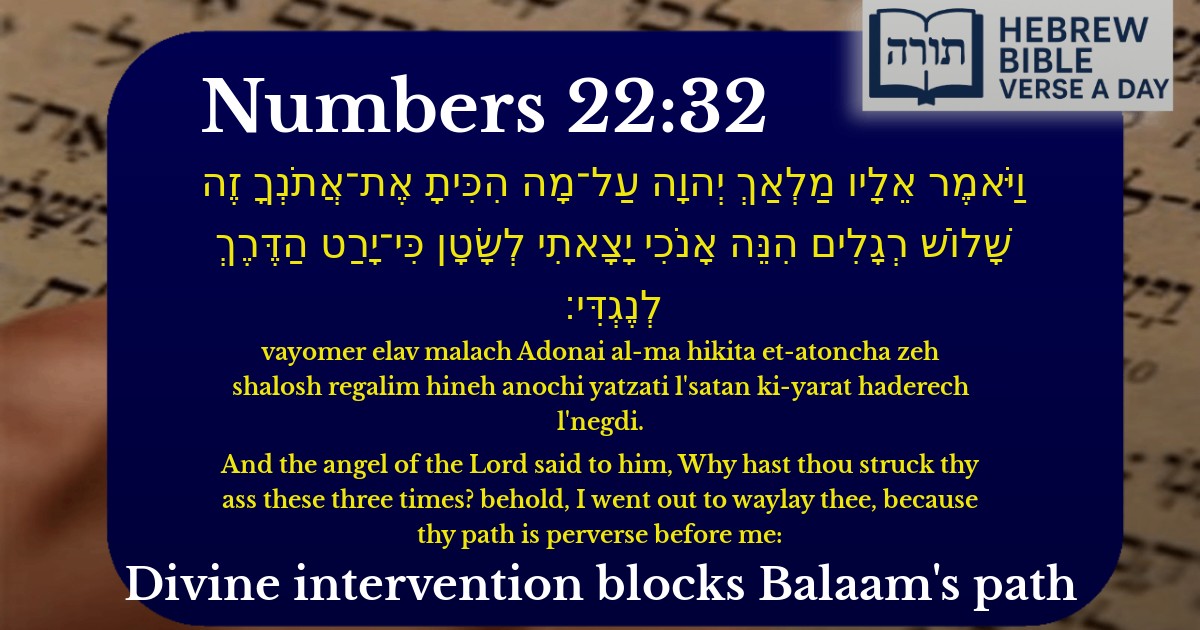Join Our Newsletter To Be Informed When New Videos Are Posted
Join the thousands of fellow Studends who rely on our videos to learn how to read the bible in Hebrew for free!
Hebrew Text
וַיֹּאמֶר אֵלָיו מַלְאַךְ יְהוָה עַל־מָה הִכִּיתָ אֶת־אֲתֹנְךָ זֶה שָׁלוֹשׁ רְגָלִים הִנֵּה אָנֹכִי יָצָאתִי לְשָׂטָן כִּי־יָרַט הַדֶּרֶךְ לְנֶגְדִּי׃
English Translation
And the angel of the Lord said to him, Why hast thou struck thy ass these three times? behold, I went out to waylay thee, because thy path is perverse before me:
Transliteration
Vayomer elav malach Adonai al-ma hikita et-atoncha zeh shalosh regalim hineh anochi yatzati l'satan ki-yarat haderech l'negdi.
Hebrew Leining Text
וַיֹּ֤אמֶר אֵלָיו֙ מַלְאַ֣ךְ יְהֹוָ֔ה עַל־מָ֗ה הִכִּ֙יתָ֙ אֶת־אֲתֹ֣נְךָ֔ זֶ֖ה שָׁל֣וֹשׁ רְגָלִ֑ים הִנֵּ֤ה אָנֹכִי֙ יָצָ֣אתִי לְשָׂטָ֔ן כִּֽי־יָרַ֥ט הַדֶּ֖רֶךְ לְנֶגְדִּֽי׃
וַיֹּ֤אמֶר אֵלָיו֙ מַלְאַ֣ךְ יְהֹוָ֔ה עַל־מָ֗ה הִכִּ֙יתָ֙ אֶת־אֲתֹ֣נְךָ֔ זֶ֖ה שָׁל֣וֹשׁ רְגָלִ֑ים הִנֵּ֤ה אָנֹכִי֙ יָצָ֣אתִי לְשָׂטָ֔ן כִּֽי־יָרַ֥ט הַדֶּ֖רֶךְ לְנֶגְדִּֽי׃
🎵 Listen to leining
Parasha Commentary
📚 Talmud Citations
This verse is quoted in the Talmud.
📖 Sanhedrin 105b
The verse is referenced in the discussion about Balaam and his donkey, illustrating the divine intervention and the moral lesson regarding Balaam's actions.


Context of the Verse
This verse (Bamidbar 22:32) occurs during the episode of Bilam and his donkey, where the angel of Hashem confronts Bilam after he strikes his donkey three times. The donkey had seen the angel blocking the path, but Bilam could not perceive it until his eyes were opened.
Rashi's Explanation
Rashi explains that the angel's question, "Why hast thou struck thy ass these three times?", is meant to highlight Bilam's cruelty. The angel emphasizes that the donkey was innocent and had acted correctly by avoiding the angel's sword. Rashi further notes that the phrase "הִנֵּה אָנֹכִי יָצָאתִי לְשָׂטָן" ("behold, I went out to waylay thee") means the angel was sent to oppose Bilam's evil intentions to curse the Jewish people.
Rambam's Perspective
Rambam (Hilchot Teshuvah 6:5) uses this episode to illustrate divine providence. He explains that Hashem intervenes in human affairs to prevent wrongdoing, as seen here where the angel obstructs Bilam's path to stop him from cursing Bnei Yisrael.
Midrashic Insights
The Midrash (Bamidbar Rabbah 20:12) elaborates that the three times Bilam struck the donkey correspond to three future instances where Bilam's plans against the Jewish people would be thwarted:
Meaning of "כִּי־יָרַט הַדֶּרֶךְ לְנֶגְדִּי"
Ibn Ezra interprets "כִּי־יָרַט הַדֶּרֶךְ לְנֶגְדִּי" ("because thy path is perverse before me") as indicating that Bilam's intentions were corrupt in Hashem's eyes. The angel was sent to correct his misguided path, both literally and spiritually.
Moral Lesson
The Sforno teaches that this episode demonstrates how even a wicked prophet like Bilam could not act against Hashem's will. The donkey, a simple animal, perceived the angel before Bilam, teaching humility and the importance of recognizing divine intervention in our lives.